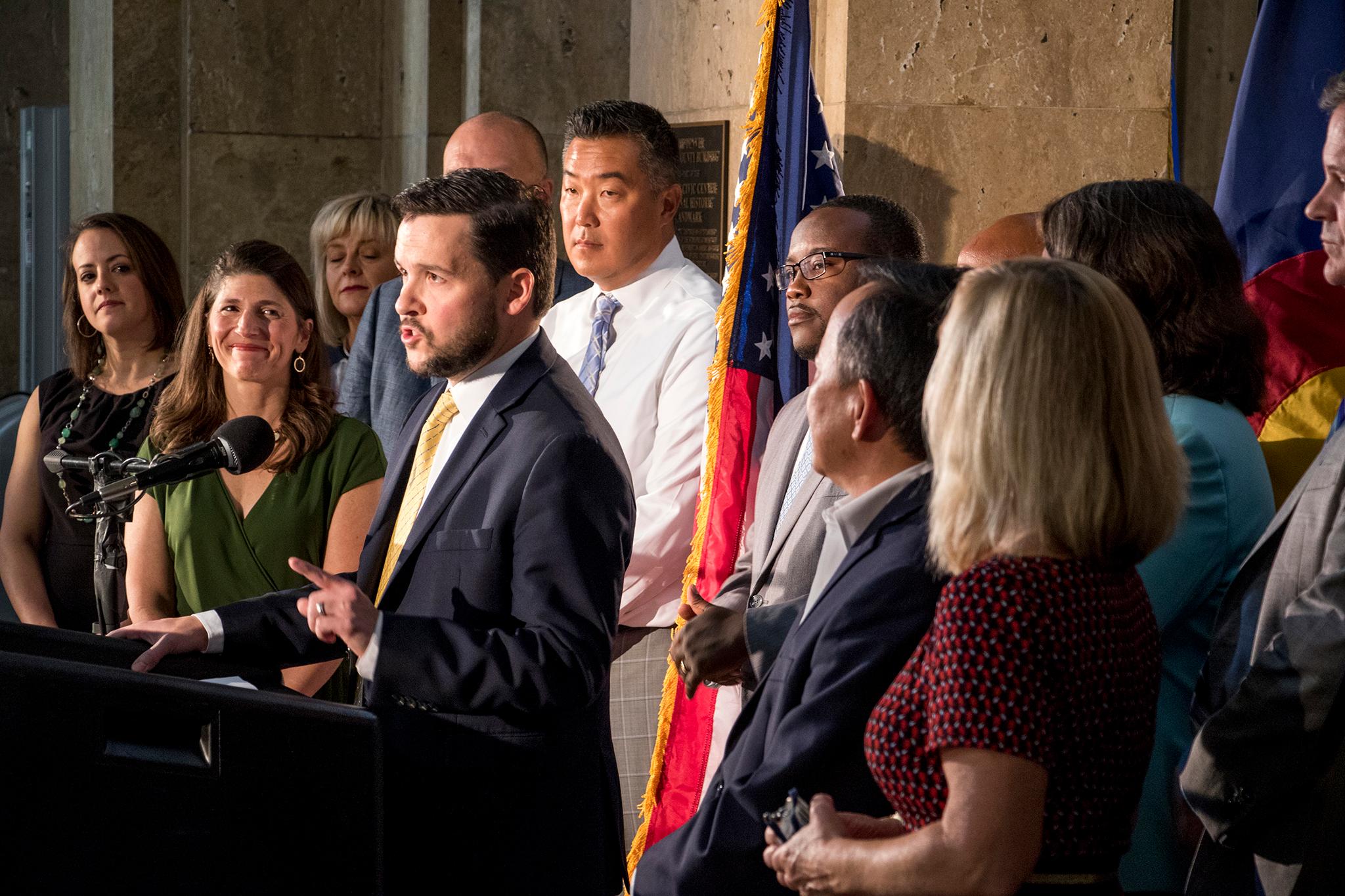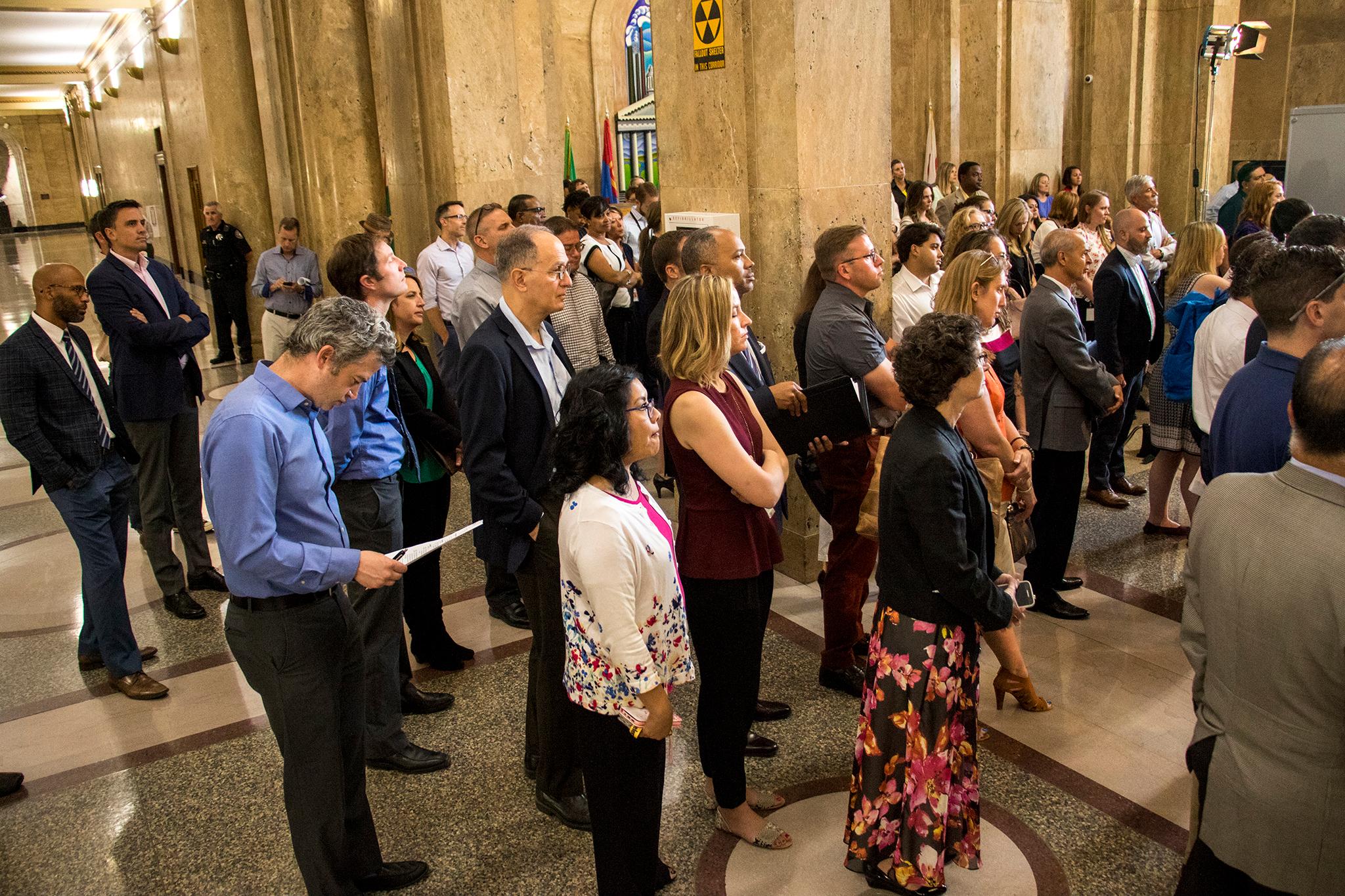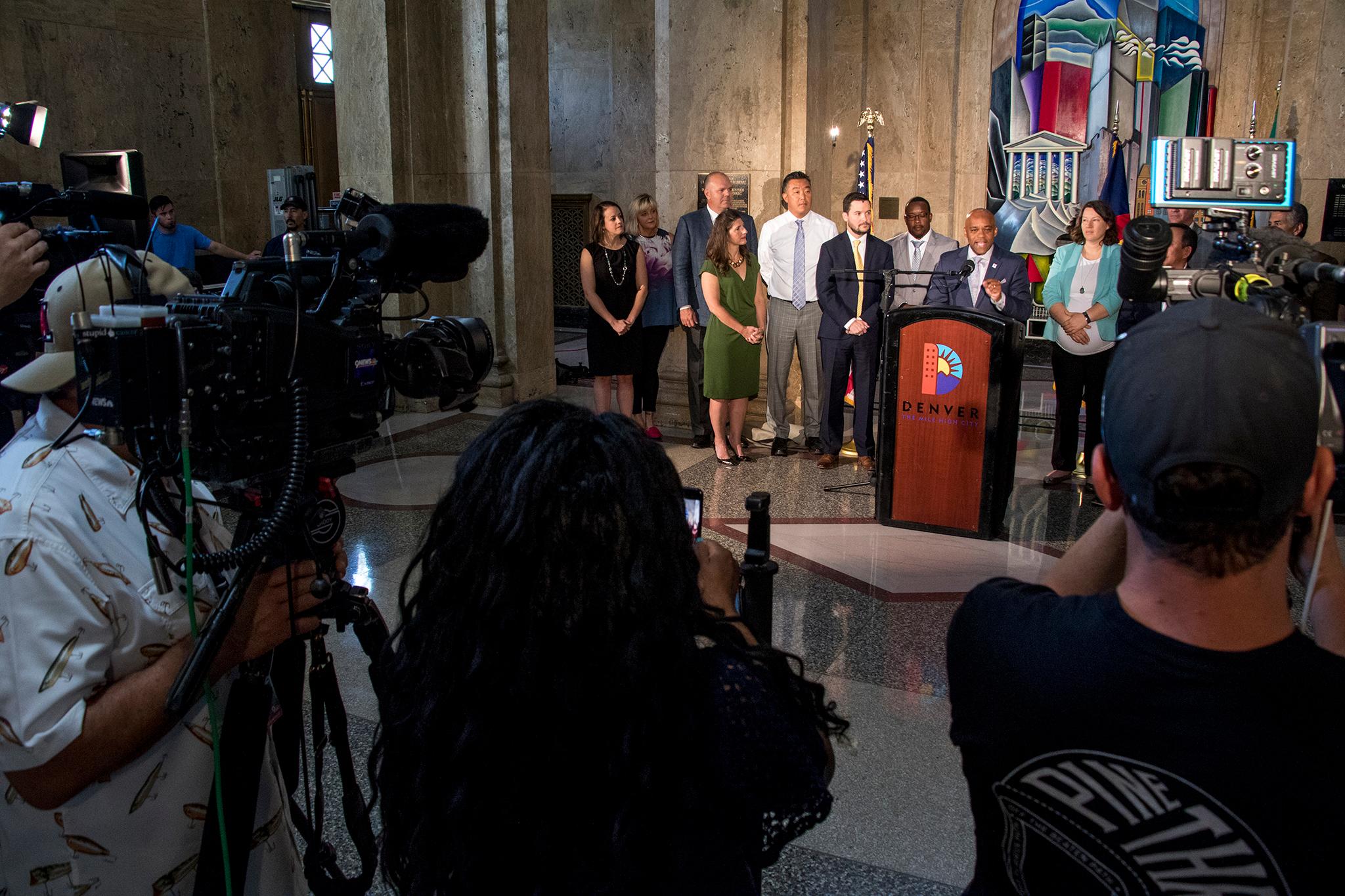Mayor Michael Hancock on Thursday unveiled his 2019 budget proposal for Denver with a spending plan that continues funding city services while expanding resources for housing, transit and mobility, public safety personnel and substance use and mental health services.
The proposed $1.46 billion budget plan makes up the city’s main operating fund (the General Fund), which is a 4.2 percent increase over the 2018 budget. It’s the amount of money the city needs to keep up its operating costs for most city services.
The overall new city total operating budget is $2.4 billion, a 3 percent increase from the 2018 budget. This funds DIA and other major infrastructure services for the city and county like wastewater management.
Hancock said that city staff focused on equity and improving affordability.
He said the budget includes a focus on preserving neighborhood character and community, and touted goals aligned with a social justice focus Hancock first introduced during his State of the City speech in July.
“This $1.46 billion proposal reflects the priorities and values of Denver’s residents, of equity, access to opportunity, affordability and neighborhood preservation,” Hancock said.
He said is focus on equity issues isn’t related to his reelection campaign.
“What you are seeing reflected here is a more mature, more wiser administration who recognizes that what public works does has as much to do with the health and well0being for children in this city as what children’s affairs does or Denver Human Services does,” Hancock said. “We all play a role.”
Chief Financial Officer and Deputy Mayor Brendan J. Hanlon said the city has “strong, sound financial management practices.”
“I’m very pleased to report that the city’s fiscal health remains strong,” Hanlon said.
The plan would increase housing resources and expand a housing rebate program.
A big part of Hancock’s proposal is it’s commitment to improving affordable housing resources. The budget includes what Hancock said is a record $50 million for affordable housing programs.
Last month, his goal got a big boost from Denver City Council after they approved a bill in August to increase the city’s special marijuana sales tax to specifically fund affordable housing. The money will help persevere and create 6,000 housing units in the city over the next five years. The plan included an agreement with the Denver Housing Authority.
Hancock said there’s “a critical need for affordable housing,” in Denver. He said his plan is a response to “unprecedented demands” placed on the city.
“This is still a city where people are moving to, still a city where people want to remain in and raise their families, and as a city, by the way, as I said this is a very non-traditional area for municipalities, and that’s why it’s important for us to have a critical partnership with Denver Housing Authority,” Hancock said.

Denver Market leader for Enterprise Community Partners Jennie Rodgers said Hancock's ideas are a good start and said she likes that the city is addressing the issue from a variety of angles.
Rodgers said expanding the rebate program is a good strategy since it will ease "the housing burden for low-income housing," options. Work still needs to be done to tackle the issue, but she said the city’s plan is a good start.
"We have to continue to work to create new strategies, funding resource programs, to benefit our most vulnerable residents,” Rodgers said.
Overall, the city’s General Fund includes a projected $32 million from tax revenue from legalized marijuana sales.
It includes $16.3 million from the city’s retail tax, $9.3 million from the affordable housing tax approved last month and $6.5 million from state share-backs. The city had initially projected the affordable housing tax would generate $8 million.
Hancock wants to work with city council to expand eligibility to the elderly and disabled property tax rebate program to include family’s, which Hanlon said were not previously considered. A family is defined as a household with at least one child.
Councilwoman-at-large Robin Kniech said Thursday expanding eligibility will require changing city ordinance.
The budget plan includes $14.7 million for services and facilities for people experiencing homelessness. It includes $4 million Hancock said is committed to hiring up to 10 peer navigators for the city’s shelters.
It begins funding Hancock’s plan to add 125 miles in bike lanes in the city over the next five years.
Hancock’s plan calls for an added $27 million to implement the city’s Mobility Action Plan, which seeks to improve safety and help provide more transportation options for residents.
The funding includes a one-time $2.9 million investment to the city’s bike network as part of Hancock’s plan to add 125 miles of bike lanes in Denver over the next five years, which is an addition to $4.2 million designated for bike lanes by Hancock's plan ($7.1 million total). It uses $800,000 to support the Denver Bike Share program, which allows for discounted and free B-Cycle rides to city residents and expand the program to underserved neighborhoods.
Denver Director at Bicycle Colorado Piep van Heuven, who’s also the chair of policy advocacy organization Denver Street Partnerships, said Hancock’s budget is “a mixed-bag” of ideas addressing some of their biggest concerns.
“We do see increases,” van Heuven said. “There are some great things in the budget. For instance, the number of bike lanes has tripled. That’s very good news for the Denver Moves Bicycle Plan."
Van Heuven said the group had requested $22 million in total budget recommendations for mobility improvements, but the budget calls for only $14 million.
She added that the city spending additional money on the Vision Zero Action Plan is a promising move and applauded the investment toward the Safe Routes to School project, which will provide safety measures for kids who bike or walk to school.
One area van Heuven said the budget doesn’t address: money for Federal Boulevard. Organizers requested $5 million for safety improvements, but the city isn't putting up any money toward improvements there. (The budget shows there's a grant funded by Regis University for median improvements at Federal Boulevard and 52nd Avenue).
The plan adds public safety personnel, including 68 new police officers and firefighters.
To keep Denver "a safe big city," the budget calls for an additional 31 police officers, which includes three new detectives that Hanlon said would focus on domestic violence cases. It also calls for "use of force" training with an emphasis on "de-escalation" tactics.
The budget includes 37 new firefighters, which includes 14 firefighters to staff the new Northfield fire station expected to be completed by mid-2019.
As part of the budget, Hancock wants to launch a neighborhood equity and stabilization team (NEST).
This team would provide resources for "vulnerable neighborhoods under the threat of displacement." Hancock's budget proposal says the city wants to do a better job of being proactive in anticipating neighborhoods' changing needs. The team will also be involved in attracting investment into "target neighborhoods" — a spokesman for the Office of Economic Development was not clear which neighborhoods those are on Thursday afternoon.
In another effort to provide planning resources, Hancock's plan includes opening two new Neighborhood Resources Centers in Globeville and Montbello and expanding the city's Financial Empowerment Centers.
It contains funding and new resources for substance use treatment.
The budget wants to use $3.1 million for a coordinated response to address substance use and mental health services in Denver. It includes funding a pilot, on-demand treatment intake program in partnership with Denver Health. The program would provide intake for opioid users seeking treatment.
The city is planning on launching a new service: A mobile needle exchange program. It would involve deploying a van in partnership with local treatment providers.

The city will seek to maintain a roughly $223 million rainy day fund, which is about 15.2 percent of the General Fund budget.
This is good news for the city and county: Hanlon said coupled with the city’s overall fiscal management, having this much set aside has led to Denver receiving strong ratings by top credit rating agencies. The ratings were released ahead of bond issuing for the Better Denver Bond Program earlier this year.
Hancock added that good credit ratings are an important measure because it gives the city access to better debt services and lower interest rates. He said the city needs to be prepared to face the potential for a downturn economy.
“We are literally one incident, terrorist incident away, one tweet away from destroying the momentum that we have seen as a city and as a nation,” Hancock said. “We need to make sure that we’re fit and ready to roll in the event that that occurs.”
Hanlon said the ratings provide “a third-party validation” to the city’s finances.
“We remain committed to ensuring Denver’s reserves stay at the level that will position us to weather any financial uncertainties that may occur in the future,” Hanlon said.
What’s next?
Now that it’s been introduced, the spending plan is in the council’s hands. Thursday’s announcement is the start of a process that will end with a Denver City Council vote in November.
The council will discuss the plan, make recommendations and get the chance to revise the budget. They will host public hearings to give folks a chance to voice their own thoughts and opinions on the budget.












